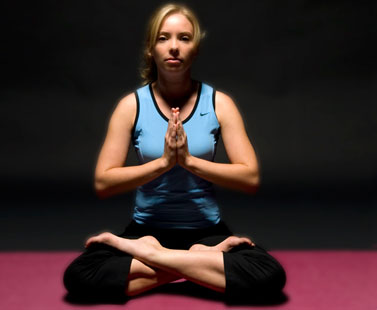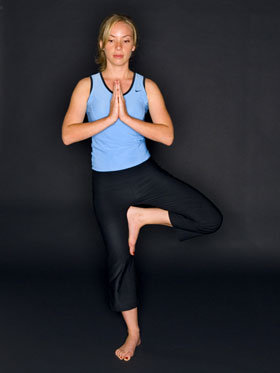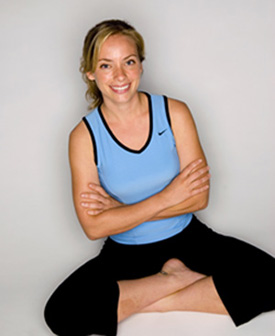Graduate research assistant draws on her experiences as cancer survivor
– Public health graduate student Karen Dyer educates others about the long-term complications of childhood cancer treatment –

Karen Dyer, diagnosed with cancer at age 15 and now cancer-free, practices yoga.
Two days after beginning her sophomore year of high school Karen Dyer was faced with a possible death sentence.
The year was 1994, and Dyer was diagnosed with Rhabdomyosarcoma, a rapidly-growing, highly malignant tumor found in roughly only 250 children in the United States each year.
Today, celebrating her 13th anniversary of being cancer free, Dyer is a 28-year-old graduate research assistant in Applied Anthropology/Public Health at USF. She looks back on the entire experience, with particular attention to the long-term health effects endured by those, like her, who have undergone invasive cancer treatments.
In initial conversations about the potential side effects of her own treatment many years ago, Dyer said her oncologist and nurse practitioner did discuss the possible long-term side effects of treatment with her and her family especially related to specific chemotherapeutic agents. The focus for all of them, however, was on survival.
“There wasn’t much of a choice,” she said. “I had an aggressive type of cancer, and I would have died without treatment.”

And so for one year Dyer was a patient at the Memorial Sloan-Kettering Cancer Center in New York where she underwent surgery to remove the primary tumor, months of chemotherapy, a month of daily radiation, a bone marrow transplant, and an emergency splenectomy to remove her spleen, which had unexpectedly ruptured during the transplant. The treatment officially ended in August 1995 and it took her 6 months to recover enough to re-enter high school full time.
Since then, Dyer has been fortunate in that not only is she cancer free, but she has had almost no long lasting health issues. She has yearly check-ups, and undergoes periodic screening tests such as echocardiograms, EKG’s, pulmonary function tests, and blood work to detect any effects in the early stages. In fact, the only medical side effect that she routinely faces relates to the loss of her spleen, which compromised her immune system.

Studies have found that health complications occurred in less than 3 percent of cancer survivors — many in fewer than 1 percent. However, long-term follow up is critically needed because certain long-term effects of cancer treatments can be dramatic, including blindness, deafness, congestive heart failure, and stroke.
Dyer noted there are ancillary problems as well, including dealing with the diagnosis, treatment and treatment-related side effects, and whether or not a person remains disease-free. Practical issues involving employment, health insurance, the financial burden of treatment and follow-up care all become part of the long-term landscape of a cancer survivor.
“Although I have not experienced major long-term physical side effects, it does not mean that I do not deal with all of these realities on a daily basis,” she said.
Her experiences have propelled her into several related community projects. Just before coming to USF Dyer worked for the National Alliance of Breast Cancer Organizations (NABCO), and then served as the Program Manager at Fertile Hope, a national non-profit organization dedicated to providing reproductive information and support to cancer patients and survivors whose medical treatments present the risk of infertility. She’s also spoken about cancer survivorship at several venues, including the President’s Cancer Panel chaired by Lance Armstrong, St. Jude’s Children’s Research Hospital, Georgetown University, and the American College Health Association.

Dyer works with COPH faculty member Dr. Jeannine Coreil, right, on a research project examining cultural diversity in breast cancer support groups.
At USF, Dyer is enrolled in a dual degree program in applied anthropology and public health. She serves as a graduate assistant on research projects related to cancer survivorship including one with Dr. Jeannine Coreil examining cultural diversity within breast cancer support groups, and another with Dr. Ellen Daley investigating cervical cancer prevention in Florida.
“Karen helped get our research project funded,” said Dr. Coreil, professor and chair of Community and Family Health at the USF College of Public Health. “Cancer survivors and lay stakeholders serve on the review committee of the Susan G. Komen Foundation, and Karen helped to infuse the cancer patient and advocacy community perspectives into the grant application. She also kept us grounded in the patient’s world-view as we developed the project, and her sensitivity is helping us to gain rapport with breast cancer support groups.”

Studies on survivorship are so critical, Dyer noted, because for many decades, the focus of cancer care was chiefly on immediate survival, but now that survival rates are increasing – especially among children –researchers are broadening their outlook on what constitutes good cancer care. Long-term survivorship is beginning to take a more central role.
“The life of a cancer patient does not end when you finish treatment,” Dyer said. “Hopefully you have many decades of healthy living ahead of you, and the more information on long-term effects that is available, the better those years can be.”

Cervical cancer survivors sought for study
Dyer is looking for potential participants for her thesis research on cervical cancer survivors. Anyone interested in being interviewed (a brief, 1-hour interview at a time and location of the interviewee’s convenience) should call Dyer at (813) 974-8379 or email her at kdyer@health.usf.edu
– Story by Sheryl Kay
– Photos by Eric Younghans/USF Health Media Center
